8+ Sample Bakery Marketing Plan
-
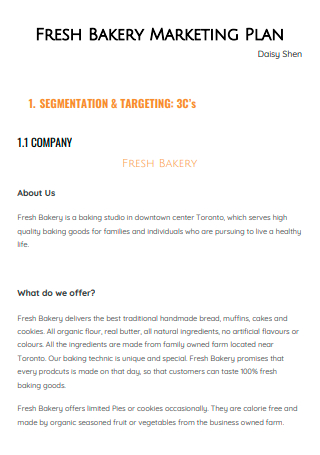
Fresh Bakery Marketing Plan
download now -
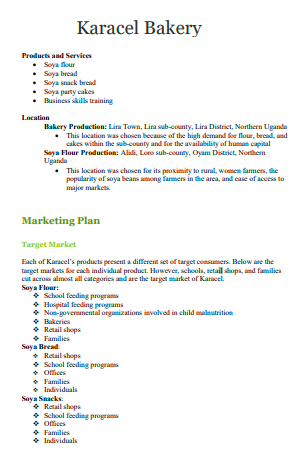
Basic Bakery Marketing Plan
download now -
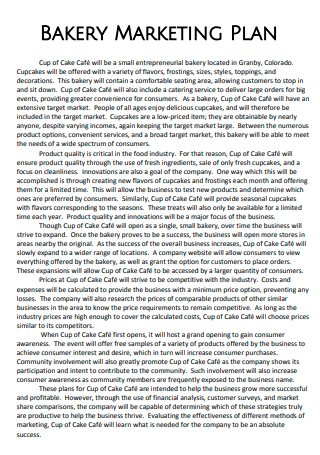
Bakery Marketing Plan Example
download now -
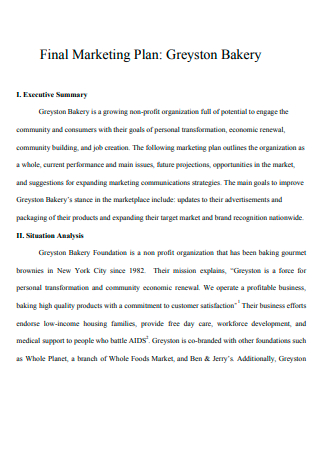
Bakery Final Marketing Plan
download now -
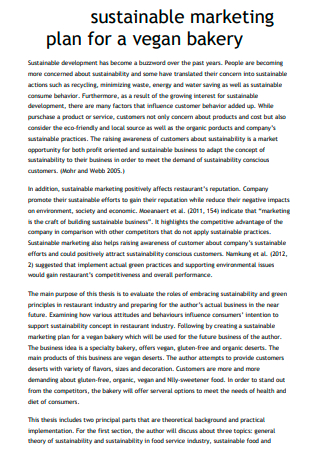
Bakery Sustainable Marketing Plan
download now -
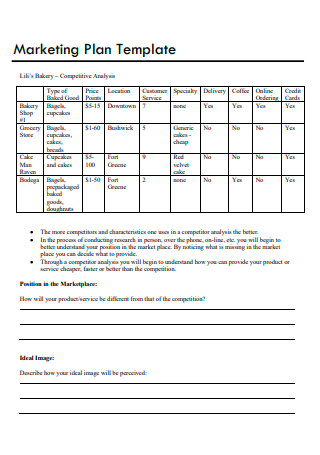
Bakery Marketing Plan Template
download now -
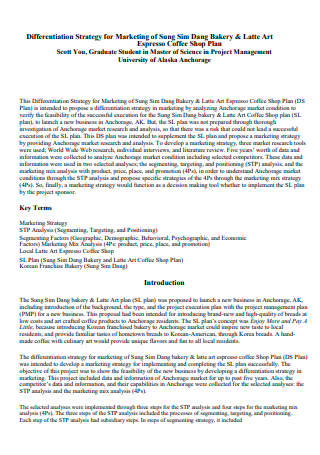
Printable Bakery Marketing Plan
download now -
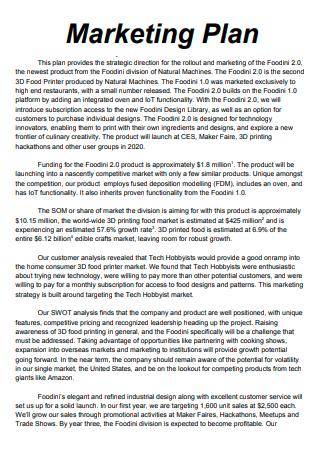
Standard Bakery Marketing Plan
download now -
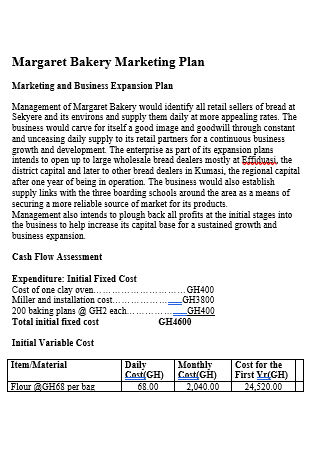
Bakery Marketing Plan in DOC
download now
FREE Bakery Marketing Plan s to Download
8+ Sample Bakery Marketing Plan
a Bakery Marketing Plan?
Benefits of Marketing
Tips in Creating a Marketing Plan
How To Attract Customers To Your Bakery
FAQs
Is marketing a specialized skill?
Why should I pursue a career in marketing?
What is a social media marketing?
What Is a Bakery Marketing Plan?
Before opening your bakery, it’s critical to understand your target market and how you’ll reach them through a bakery marketing strategy. A bakery marketing plan enables you to identify a viable location for your business and ascertain the amount of money potential customers are willing to spend on your sweet treats. Additionally, it is critical to include market research and a bakery market analysis in your business plan to demonstrate to potential investors that your venture has a chance of success. According to statistics, 65% of bakeries employ fewer than ten people.
Benefits of Marketing
Whether you’re starting a business or considering ways to expand an existing one, a marketing plan is a critical tool for assisting your enterprise’s growth and expansion. A well-crafted marketing plan enables you to take a more targeted and cost-effective approach to market activities to increase revenue and ROI, rather than the all-too-common and wasteful “spray and pray” approach. A marketing plan’s purpose is to assist in articulating a strategy for promoting your brand and increasing sales or revenue for your business. Additionally, it provides insights into your market, your ideal customers, and effective ways to engage them. If you’re curious about its other benefits, here are a few.
Tips in Creating a Marketing Plan
A well-thought-out marketing strategy can propel your company to new heights. It can assist you in realizing your business objectives by offering guidance, deadlines, concrete methods, and more to your team. If you’ve never done this before, it’s reasonable that you’re unsure where to begin and which elements of your marketing plan should be included. If you’re still interested, here are some helpful hints on creating one.
1. Begin with a concise executive summary.
Generally, the executive summary comes first in your marketing plan. It’s essentially a synopsis or concise overview of your firm and the important takeaways from your marketing plan. Additionally, you can add your company’s accomplishments and future ambitions to your resume. Bear in mind that your executive summary should be brief and direct. Rather than boring your readers to sleep, it should capture their attention and pique their interest in the remainder of the strategy.
2. Indicate the mission, vision, and values of your business.
Before getting started with marketing, it’s good to review your company’s values, goals, and mission. This assists in putting all of the information in your marketing plan into context. It explains why you are doing what you are doing. This part is critical for anyone who reads your marketing strategy because it educates them about the ultimate goal of your organization and helps them make sense of your marketing goals, actions, and plans.
3. Recognize the market and its competitors.
The next stage is to conduct a thorough analysis to support your marketing strategy. This is frequently accomplished by analyzing your present market scenario, competitors, and, most crucially, your own company’s strengths and limitations. You can change this template by changing the colors to match your brand, adding your information, and incorporating it into a marketing plan, on its own, or in a report or presentation. Rather than including a tedious table that no one wants to read, bring attention to your study with a well-designed SWOT analysis like the one above.
4. Define your ideal client.
It’s critical to identify your buyer or ideal consumer to develop better-targeted marketing strategies. Naturally, each business has a unique target customer. Additionally, you may have multiple types of customers. For instance, a clothing store may manufacture clothes concurrently for teenagers and older ladies. The pie chart identifies which segment of your customer base comprises the most of your revenue, allowing you to direct most of your efforts toward that segment. Another interesting technique to develop a customer persona is to design it in the manner of a résumé. This is advantageous for including additional information on a single page without clogging the design.
5. Make a presentation about your marketing approach.
Now for the good part. Create a list of one or more marketing strategies and the associated tactics in this stage. This is best done visually to ensure that the entire team understands each step. Another technique to illustrate your marketing strategy is to include deadlines. This is easily accomplished using a timeline or a Gantt chart. If you wish to take a different approach, you can also visualize your marketing strategy using an infographic. An infographic is visually appealing and can be used with your presentations or reports. Additionally, you can share it independently with your marketing team or other colleagues.
6. Outline your marketing goals.
In this section of the marketing plan, you must state your objectives. Outline your marketing goals and objectives, and be careful to utilize specific numbers rather than generalizations. For instance, if you aim to boost website traffic, specify the precise target so you can determine whether you achieved it or not. Keep in mind that your marketing plan and strategy should include SMART targets.
How To Attract Customers To Your Bakery
A successful business requires a high-quality product. For instance, chefs assert that creating a great dish is exceedingly tricky without high-quality raw materials. Even if your sector is cafeterias, bakeries, and ovens, the same principle applies: a genuinely excellent product makes a significant difference and, more importantly, impacts how your clients perceive the experience. Purchasing frozen bread is one of the choices that contribute to this goal. Due to their characteristics, frozen doughs are a solid bet in this type of business. They let you have special items while also being great for managing and controlling inventory and sales, as they can be ordered and prepared in response to demand. In this regard, frozen doughs for bakeries make it quite simple to provide the customer with anything from savory pastries to chocolate croissants and various items in which bread plays a prominent role. Once you’ve selected the appropriate goods, how can you draw customers to your establishment? The following recommendations will significantly simplify the process.
1. Enhance the scent
Sensory marketing is how people become more receptive to purchasing a product or service through vigorous activities. Naturally, it is inextricably linked to the senses. Increasing one aspect of a café, bakery, or oven is straightforward: the aroma. Leave your business’s door open and ensure that whatever you’re cooking emits a pleasant smell that draws passers-by to your door. Baking frozen croissants, for instance, is critical to accomplishing this.
2. Make new items and recipes available.
Occasionally, to garner attention, you must tempt the customers. How is this accomplished? With unfamiliar items or recipes that intrigue and arouse their curiosity. It’s also more accessible than ever nowadays, as numerous goods combine traditional flavors with innovative formulae and are pretty appealing. Additionally, it may be prudent to add gluten-free items or whole grains suitable for various diets.
3. Prepare the products properly and provide complimentary samples.
Frozen doughs, which enable you to create delectable dishes with a single blast in the oven, are ideal for finishing the products to taste. For instance, pains au chocolat crème and other items can be coated with syrup before being dusted with icing sugar or chocolate. Additionally, this is not sufficient: you must also tell it. Thus, employing explanatory signs to describe the components or emphasize a particular cuisine feature may be brilliant. Sometimes, the easiest way to persuade somebody to purchase a product is to try it. At some point, bake a delicacy, slice it up, and place it near the end of the sale so that clients can sample it while deciding what to take home. It’s one of those small gestures that the customer will undoubtedly appreciate.
4. Maintain an active social media presence and develop bespoke merchandising
They assert that if you are not conveying what you do, you do not exist in the modern era. As a result, your social media channels must reflect what you intend to deliver as a business. This means keeping them active and offering stuff that is engaging to the individuals that follow you in addition to your items. Similarly to the preceding, image is critical to the brand. Along with maintaining the visual identity of your restaurant, bakery, or oven, you may also produce goods that incorporate it properly. For instance, a stylish tote bag with your business logo that can be used to purchase bread is one of those touches that will never go out of style.
5. Conduct brief consumer surveys.
You ought to inquire about what works and what does not in your firm. You can elicit additional information about regular customers’ impressions by asking if they like the previous item they purchased or why they always chose a particular product. If you follow up with a present or product, they will be overjoyed to have been able to assist you.
6. Make inventive offers and have a welcoming demeanor.
Each season has specific dates that can be leveraged to give discounts on products and services related to your business. For example, you can pair a refreshing coffee with a complimentary product in the summer and conduct a campaign. In the autumn, holidays like Halloween can generate discussion about “terrifying” deals, and at Christmas, you can also capitalize on the season by offering winter-themed fare. There are no restrictions on creativity. Additionally, welcoming customers with a smile and inquiring about their well-being is always appreciated kind gestures. When engaging in a lengthier conversation, keep in mind if the other person wishes to speak or is not in the mood. Being friendly and wishing customers a good day following purchase can significantly improve the customer experience.
FAQs
Is marketing a specialized skill?
To ensure your business’s success, you must support in marketing abilities. For a straightforward reason: marketing increases awareness of your products and converts buyers. Investing in marketing talents is more than simply purchasing marketing tools and hoping for the best.
Why should I pursue a career in marketing?
Studying marketing will assist you in comprehending why clients think or behave a certain way when making a purchase. Additionally, you will understand their requirements, how to influence them, and how their actions might benefit your organization. The marketing introduces you to a variety of fields.
What is a social media marketing?
People who use social networks and social media for marketing a company’s products and services call this type of marketing “social media marketing” or “SMM.” Companies can use social media marketing to connect with their customers and find new ones while promoting their culture, mission, or tone.
Running a small business is not easy – and beginning a bakery can be particularly challenging unless you establish a relationship with local clients. However, by following these guidelines, you’ll have an easier time getting your business off the ground or extending your client base. Consider a second look and consider how you may apply these recommendations to your advantage.
